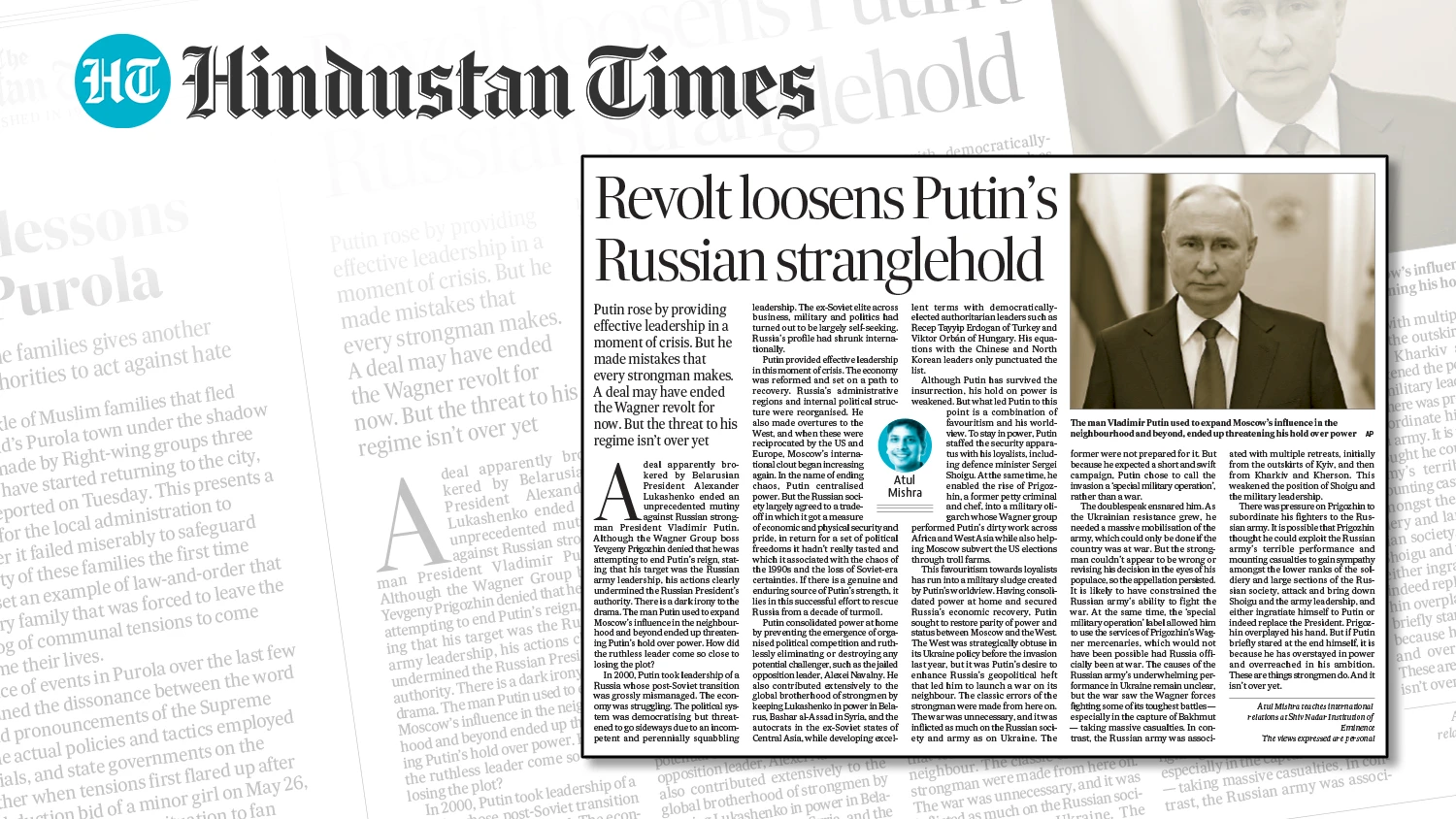Revolt loosens Putin’s Russian stranglehold
Putin made mistakes that every strongman makes. A deal may have ended the Wagner revolt for now. But the threat to his regime isn’t over yet.
A deal apparently brokered by Belarusian President Alexander Lukashenko ended an unprecedented mutiny against Russian strongman President Vladimir Putin. Although the Wagner Group boss Yevgeny Prigozhin denied that he was attempting to end Putin’s reign, stating that his target was the Russian army leadership, his actions clearly undermined the Russian President’s authority. There is a dark irony to the drama. The man Putin used to expand Moscow’s influence in the neighbourhood and beyond ended up threatening Putin’s hold over power. How did the ruthless leader come so close to losing the plot?
In 2000, Putin took leadership of a Russia whose post-Soviet transition was grossly mismanaged. The economy was struggling. The political system was democratising but threatened to go sideways due to an incompetent and perennially squabbling leadership. The ex-Soviet elite across business, military and politics had turned out to be largely self-seeking. Russia’s profile had shrunk internationally.
Putin provided effective leadership in this moment of crisis. The economy was reformed and set on a path to recovery. Russia’s administrative regions and internal political structure were reorganised. He also made overtures to the West, and when these were reciprocated by the US and Europe, Moscow’s international clout began increasing again. In the name of ending chaos, Putin centralised power. But the Russian society largely agreed to a tradeoff in which it got a measure of economic and physical security and pride, in return for a set of political freedoms it hadn’t really tasted and which it associated with the chaos of the 1990s and the loss of Soviet-era certainties. If there is a genuine and enduring source of Putin’s strength, it lies in this successful effort to rescue Russia from a decade of turmoil.
Putin consolidated power at home by preventing the emergence of organised political competition and ruthlessly eliminating or destroying any potential challenger, such as the jailed opposition leader, Alexei Navalny. He also contributed extensively to the global brotherhood of strongmen by keeping Lukashenko in power in Belarus, Bashar al-Assad in Syria, and the autocrats in the ex-Soviet states of Central Asia, while developing excellent terms with democratically-elected authoritarian leaders such as Recep Tayyip Erdogan of Turkey and Viktor Orbán of Hungary. His equations with the Chinese and North Korean leaders only punctuated the list.
Although Putin has survived the insurrection, his hold on power is weakened. But what led Putin to this point is a combination of favouritism and his worldview. To stay in power, Putin staffed the security apparatus with his loyalists, including defence minister Sergei Shoigu. At the same time, he enabled the rise of Prigozhin, a former petty criminal and chef, into a military oligarch whose Wagner group performed Putin’s dirty work across Africa and West Asia while also helping Moscow subvert the US elections through troll farms.
This favouritism towards loyalists has run into a military sludge created by Putin’s worldview. Having consolidated power at home and secured Russia’s economic recovery, Putin sought to restore parity of power and status between Moscow and the West. The West was strategically obtuse in its Ukraine policy before the invasion last year, but it was Putin’s desire to enhance Russia’s geopolitical heft that led him to launch a war on its neighbour. The classic errors of the strongman were made from here on. The war was unnecessary, and it was inflicted as much on the Russian society and army as on Ukraine. The former were not prepared for it. But because he expected a short and swift campaign, Putin chose to call the invasion a ‘special military operation’, rather than a war.
The doublespeak ensnared him. As the Ukrainian resistance grew, he needed a massive mobilisation of the army, which could only be done if the country was at war. But the strongman couldn’t appear to be wrong or revising his decision in the eyes of his populace, so the appellation persisted. It is likely to have constrained the Russian army’s ability to fight the war. At the same time, the ‘special military operation’ label allowed him to use the services of Prigozhin’s Wagner mercenaries, which would not have been possible had Russia officially been at war. The causes of the Russian army’s underwhelming performance in Ukraine remain unclear, but the war saw the Wagner forces fighting some of its toughest battles — especially in the capture of Bakhmut — taking massive casualties. In contrast, the Russian army was associated with multiple retreats, initially from the outskirts of Kyiv, and then from Kharkiv and Kherson. This weakened the position of Shoigu and the military leadership.
There was pressure on Prigozhin to subordinate his fighters to the Russian army. It is possible that Prigozhin thought he could exploit the Russian army’s terrible performance and mounting casualties to gain sympathy amongst the lower ranks of the soldiery and large sections of the Russian society, attack and bring down Shoigu and the army leadership, and either ingratiate himself to Putin or indeed replace the President. Prigozhin overplayed his hand. But if Putin briefly stared at the end himself, it is because he has overstayed in power and overreached in his ambition. These are things strongmen do. And it isn’t over yet.
Atul Mishra teaches international relations at Shiv Nadar Institution of Eminence. The views expressed are personal
